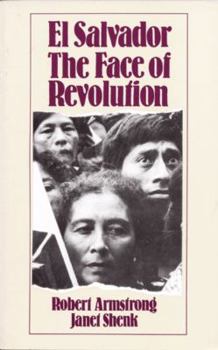El Salvador
Select Format
Select Condition 
Book Overview
Two of the leading U.S. experts on Central America provide the definitive study of the history and reality of the situation in El Salvador through the early 1980s. This description may be from another edition of this product.
Format:Paperback
Language:English
ISBN:0896081370
ISBN13:9780896081376
Release Date:July 1999
Publisher:South End Press
Length:283 Pages
Weight:0.82 lbs.
Dimensions:1.3" x 6.0" x 8.4"
Customer Reviews
2 ratings
Powerful story about the civil war in El Salvador
Published by Thriftbooks.com User , 15 years ago
This is a good, but very relentless and depressing history of events leading up the the civil war in the 1980's, and the U.S. role in supporting the oligarchy that brutalized labor, the poor, and the liberal Catholic leaders who took up their cause. During the cold war, we supported a number of horribly repressive governments that declared themselves anti-communist. I visited El Salvador on a business trip in 2005 and was amazed that in bookstores there it is almost impossible to find a history of the civil war that tore the country apart for a decade. I found one personal published account of the war (in Spanish) at an art gallery of all places, and unfortunately I didn't buy it because I thought there would be other broader historical accounts available. I ended up buying this book when I returned, and it was helpful in understanding what happened there. People in El Salvador don't like to talk about the war (at least with strangers). I was fortunate to be given a personal tour of the under-cathedral tomb of Archbishop Oscar Romero, which was quite moving. Remarkably, even there in the safety of the Catholic church there was only a simple sentence declaring that he was assasinated on a given date, but there was no interpretation or historical context of the event. Apparently there are many in El Salvador who want to bury the past.
dated, but still powerful
Published by Thriftbooks.com User , 20 years ago
It seems like so long ago now, the conflict in Central America of the 1980s. Not only was it viewed as a peripheral Cold War conflict, which encouraged the US to support notoriously corrupt and brutal regimes, but it was also a series of extremely complex dynamics in small sovereign nations that virtually no one knew much about. El Salvador, along with Guatamala and pre-Sandinista Nicaragua, was one of the worst countries "down there." This book offers an intimate portrait of a gathering revolution, cataloguing the injustices and casual brutalites in a frightening indictment. The bottom line is that a layer of evil people simply must be swept away and the US has no business standing in the way of it. In other words, it is the classic argument for "indiginous revolution," dismissing the claims of cold warriors that the revolutionaries are communists supported by Moscow, etc. While this is only of historical interest, it is a useful case study of misguided policy, which we would do well to study today. The stories in the book are truly horrible. One young army officer, for example, raped a young aristocrat but was let off from prosecution because he appeared "promising." As scary as they are, I have since discovered that some of them are inaccurate. For example, the future president of El Salvador, whose name I think was Napoleon Duarte, was reported to have been tortured and that the tips of his fingers on one hand were cut off during interrogation. It turns out that he lost them as a construction worker. This diminishes the credibility of the book somewhat, but it is still very powerful. Recommended for a look at the COld War mentality and as a guide to the self-deception that can go on in Washington DC.






